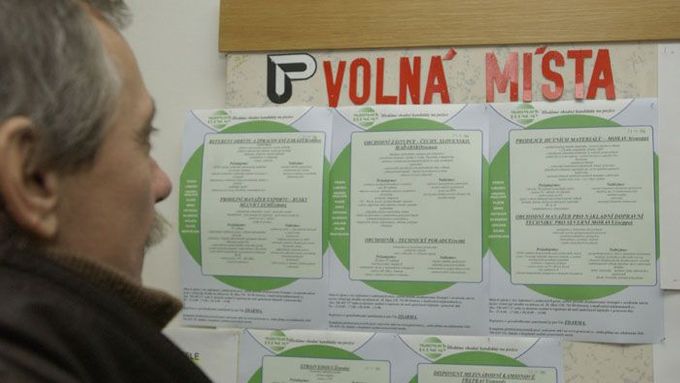Prague - How do you solve the problem of diminishing workforce in the growing economy? By opening up the labour market to foreigners, says the government.
From summer 2009, anybody wishing to work in the Czech Republic, can apply for the green card. At least, that is the joint plan of the Ministries for Industry, Labour and Social Affairs and Interior aimed at solving the first, so far relatively mild, of population crises the country can expect in the next ten years.
The plan should prevent the looming shortage of workforce on the labour market due to the shrinking numbers of people in working age.
Minister Nečas who heads the resort of labour and social affairs says the government will discuss the plan in September.
How to get the card
The Deputy Prime Minister Nečas thinks the current support schemes for the workforce migration needs to change radically.
"Those getting a green card will also get both a long-term residence permit and work permit," Mr Nečas said explaining the Green Card's main function.
The Green Card will be available from the Czech embassies abroad and will be valid for two years.
Currently, things are more complicated for the foreigners. First, they have to find work in the Czech Republic and then they go to the Czech embassy in their country to apply for a long term visa.
A previous project, spearheaded by the former Prime Minister Vladimír Špidla, was an attempt to make working in the Czech Republic easier. But the scheme was limited to highly qualified people from some Eastern European and Asian countries from Croatia to Kazakhstan.
According to Mr Nečas, this selection method failed, as only a couple of hundreds of foreigners were granted permanent residency, and, moreover, most of them were already living in the Czech Republic by that time.
In the future, people from all the countries will be able to work in the Czech Republic using the Green Card, provided they get an authorization from the Interior Minister who has the right to strike out some "danger" areas, e. g. some countries with dictatorial regimes.
The new model should ensure the foreigners, especially those less qualified, leave the country in case they lose their employment. The work visa will be invalidated if they don't find replacement employment within two or three months.
What is on offer
Until now, those interested in working in the Czech Republic had also problems with getting information about employment opportunities. This should also change under the new system: there will be a national list of all the jobs on offer Czech candidates did not show interest in during the last three month.
The Internet-based list will be limited to specific jobs and regions with a shortage of people. "We would like the new system to start in mid-2009," Mr Nečas explained.
He claims the new system excludes corrupt practices as the free jobs will be put on the internet automatically, according to criteria and rules defined in advance. The application will be successful for all those able to organize a job for themselves in the Czech Republic.
Ten critical years
Already now, the foreigners are saving the employment market from understaffing. Last year the number of those able to work did not fall only because there was an influx of 35 thousand people from abroad.
But the new home-grown working force will continue to decline. This year, there will be 171 thousand Czechs aged 28 years, but, according to the Czech Statistical Office, only 131 thousand those aged twenty, and 122 thousand of fifteen year olds.
At the same time, over the next ten years, some strong age-groups born after WWII will be retiring; around 150 thousand people will be leaving the employment market every year.
The Green Card project aims to at least keep the current influx of workforce from abroad. At the same time, it should prevent the need for those interested in working here to turn to job agencies that often work together with the organized crime. In a transparent system they will be well able to find work on their own and/or have control over what's on offer from the agencies.
Business says: a first necessary step
The employers welcome the ministers' plan. "We have been fighting for something like that many years," Mr Jaroslav Míl, president of the Industry and Transport Association, says.
There was talk about the threat of workforce shortfall already in the Government led by Mr Špidla, but only the current one is starting to try to solve the problem, he says.
"The situation reached critical proportions," Mr Míl points out, referring to the increase in black market activities. Much lesser number of businesses would had been looking for illegal immigrants on offer in the last five years, had there been twenty thousand more legal arrivals from abroad, he adds.
He sees the introduction of the Green Cards as only the first and necessary step that should be followed by more. "If the colleges don't open up to foreign students, there will be nobody to teach in them," he warns.
And it could be foreigners graduating from universities that could provide businesses with employees having the necessary qualification.
IOM: watch the agencies
Mr Jan Schroth from the International Organization for Migration (IOM) also welcomes the liberalization of the work market for the foreigners. But he does not approve of the details.
He thinks it's not such a good idea to get rid of Mr Špidla's condition of higher qualification. He feels the Czech Republic could be targeted by non-skilled workers who would find employment at the assembling lines of large car manufacturers and electrical firms.
Should they be granted permanent residence after five years work, the Czech Republic could face the guest workers problems similar to those in the neighbouring Germany.
On the other hand, the government could go one step further and grant those foreigners with special skills or qualification a visa to look for work.
Mr Schroth also points out to the example of US, Germany or Netherlands where only ten agencies are authorized to mediate jobs for Green Card holders. In the Czech Republic 1700 companies will get the same chance; 700 of them specialize in recruiting workers from the countries outside the European Union.
"That could lead to a further enhancement of a client system under which the job agencies would illegally cash percentage from the foreign workers' pay," Mr Schroth warns.
Mr Míl thinks these fears are unfounded: "The state already can monitor job agencies now. And if the system is simple enough, it will start to dispose of both the client system and the black labour automatically."
You can find the story in its original Czech version here.



